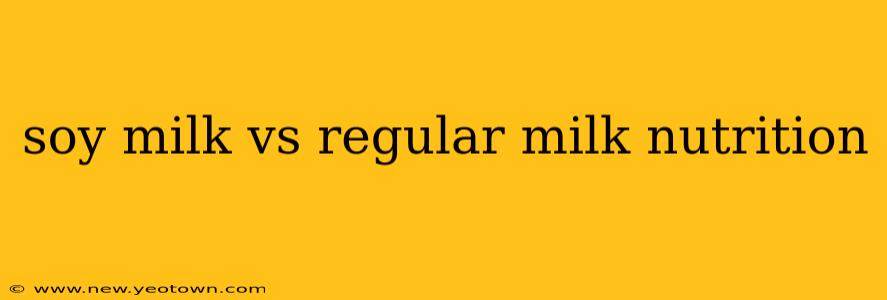Choosing between soy milk and regular milk can feel like navigating a nutritional maze. Both offer calcium and protein, but their nutritional profiles differ significantly, impacting everything from bone health to heart health. Let's unpack the differences and help you make an informed choice for your individual needs.
This isn't just a simple "better" or "worse" comparison; the "best" milk depends entirely on your dietary preferences, health goals, and potential allergies or intolerances. This comprehensive guide will explore the nutritional landscape of both, comparing their strengths and weaknesses, so you can decide which beverage best fits your lifestyle.
What are the key nutritional differences between soy milk and cow's milk?
This is a fundamental question, and the answer lies in comparing their macronutrient and micronutrient profiles. Cow's milk, traditionally a staple in many diets, is rich in naturally occurring nutrients. Soy milk, on the other hand, is a processed beverage derived from soybeans, often fortified to boost its nutritional value.
Cow's Milk: Naturally high in protein, calcium, and vitamin B12. It also contains significant amounts of potassium and riboflavin. The fat content varies depending on whether you choose whole, 2%, 1%, or skim milk.
Soy Milk: While naturally lower in some nutrients than cow's milk, soy milk is often fortified to contain similar levels of calcium and vitamin D. It is a good source of protein and is naturally higher in some vitamins like vitamin E and certain B vitamins compared to unfortified cow's milk. However, it lacks the naturally occurring vitamin B12 found in cow's milk.
Is soy milk healthier than cow's milk?
There isn't a simple "yes" or "no" answer to this. The "healthier" option depends entirely on individual needs and preferences.
For someone with lactose intolerance, soy milk offers a viable dairy-free alternative packed with protein and other essential nutrients (when fortified). However, those with soy allergies must avoid soy milk completely.
Those with a strong preference for the taste and texture of cow's milk might find it more satisfying, and the naturally occurring nutrients present can be beneficial. However, individuals concerned about saturated fat might opt for low-fat or skim cow's milk or soy milk.
How does the protein content compare in soy milk and cow's milk?
Both soy milk and cow's milk are excellent sources of protein, essential for building and repairing tissues. However, the type of protein differs. Cow's milk contains whey and casein proteins, while soy milk contains soy protein. The bioavailability (how well your body absorbs and utilizes the protein) is comparable between the two, though some studies suggest slight variations depending on individual factors. The amount of protein per serving can vary depending on the brand and type of milk.
Which milk is better for building strong bones?
Both soy milk and cow's milk contribute to bone health, primarily due to their calcium content. However, cow's milk often has a naturally higher calcium content than unfortified soy milk. Many soy milk brands are fortified with calcium to match or exceed the levels found in cow's milk, making the bone-building benefits comparable when choosing a fortified variety. Vitamin D, another crucial nutrient for bone health, is frequently added to both soy and cow's milk.
Does soy milk contain hormones?
This is a common concern. While some concerns have been raised about the potential for soy to contain phytoestrogens (plant-based estrogens), current scientific evidence does not suggest significant negative health impacts from consuming soy milk in moderation for most individuals. The levels of phytoestrogens in soy milk are considerably lower than what is considered to cause adverse effects. It's crucial to remember that these are plant-based hormones, vastly different from the animal-based hormones found in some dairy products.
Is soy milk good for weight loss?
Both soy milk and cow's milk can be part of a weight-management plan. The calorie and fat content significantly influence this. Choosing low-fat or skim versions of either helps reduce overall caloric intake. However, remember that overall diet and lifestyle habits are more crucial for weight loss than the choice between soy milk and cow's milk alone.
Ultimately, the choice between soy milk and cow's milk is a personal one. Consider your individual dietary needs, preferences, and any allergies or intolerances before making a decision. Both can be part of a healthy diet, contributing essential nutrients and playing a role in maintaining overall well-being. Consulting with a registered dietitian or your healthcare provider can provide personalized guidance.

